人教新目标版英语七年级下Unit 12 What did you do last weekend?Section A GF-3c课件(29张无素材)
文档属性
| 名称 | 人教新目标版英语七年级下Unit 12 What did you do last weekend?Section A GF-3c课件(29张无素材) | 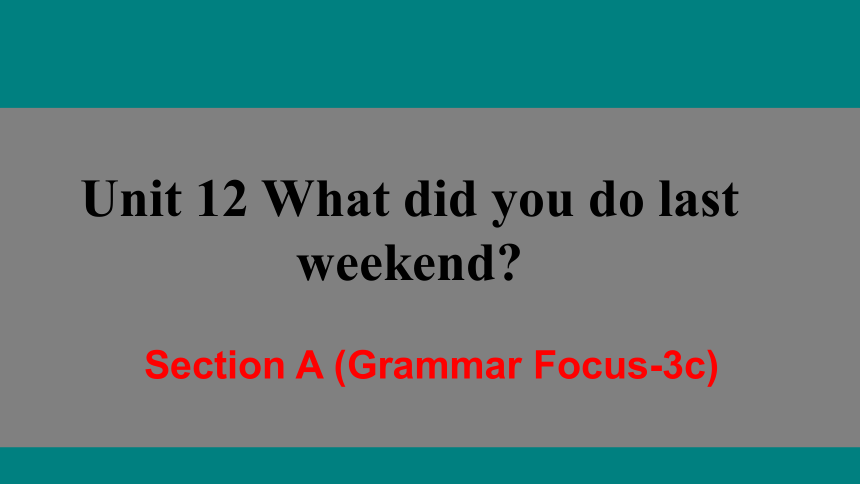 | |
| 格式 | pptx | ||
| 文件大小 | 3.8MB | ||
| 资源类型 | 教案 | ||
| 版本资源 | 人教新目标(Go for it)版 | ||
| 科目 | 英语 | ||
| 更新时间 | 2021-12-09 22:29:45 | ||
图片预览

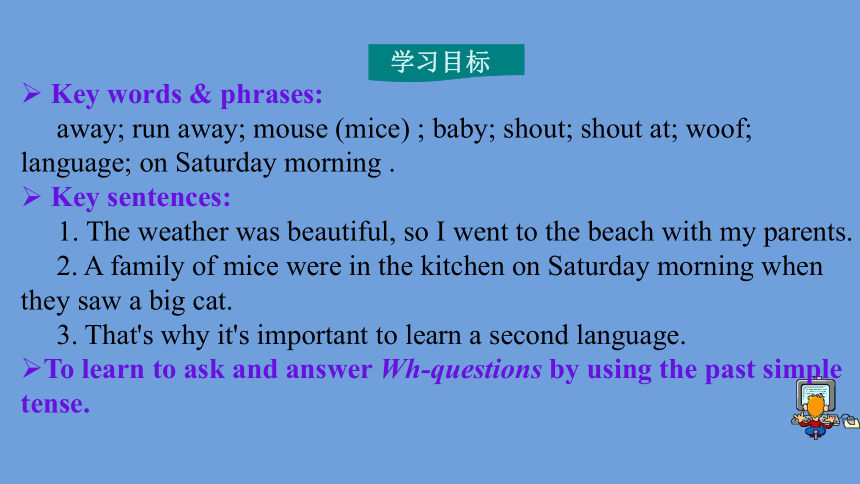
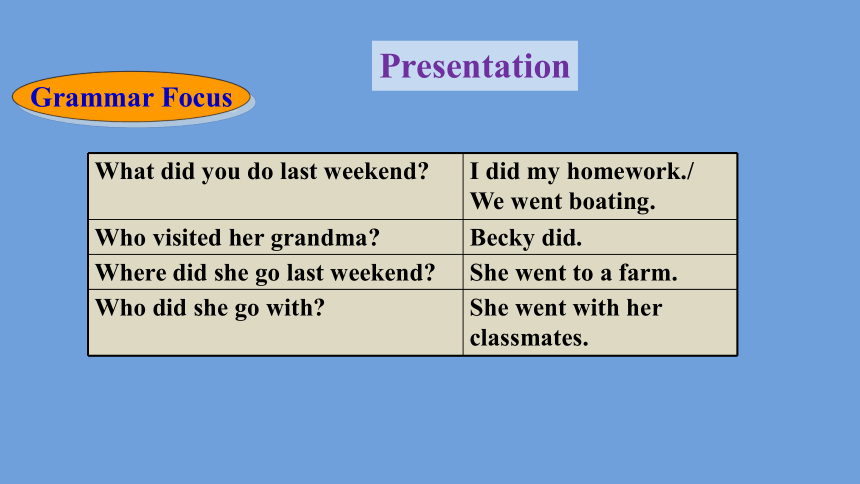
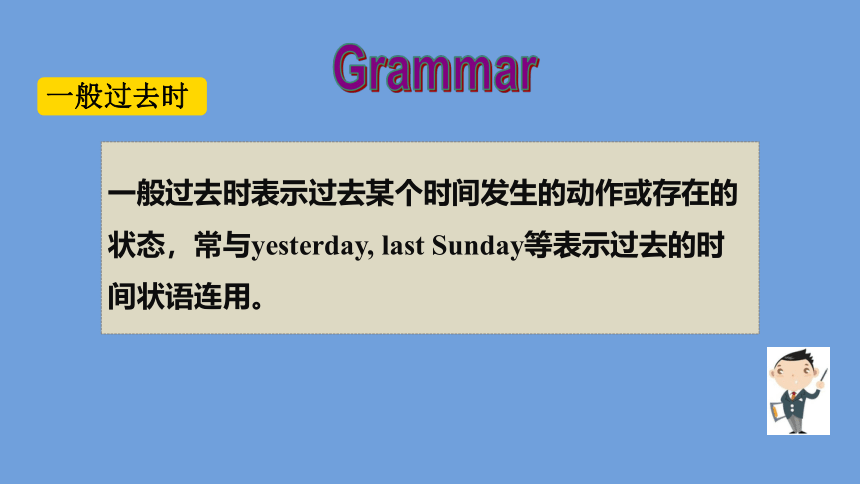
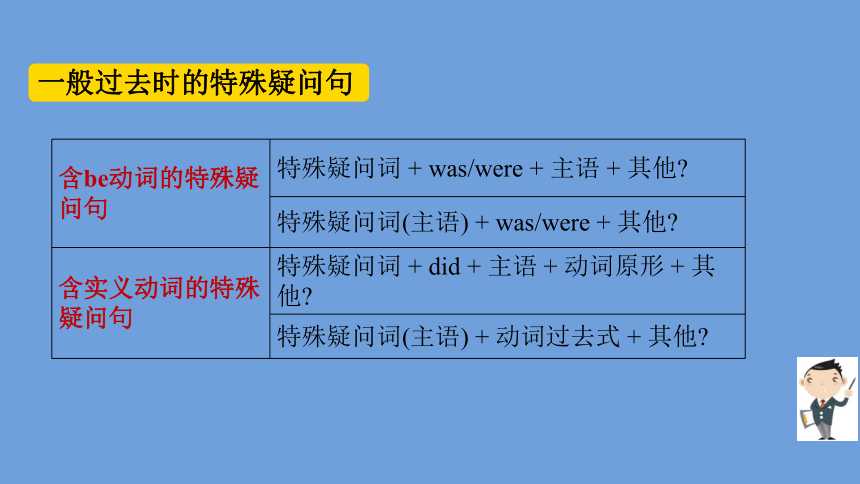
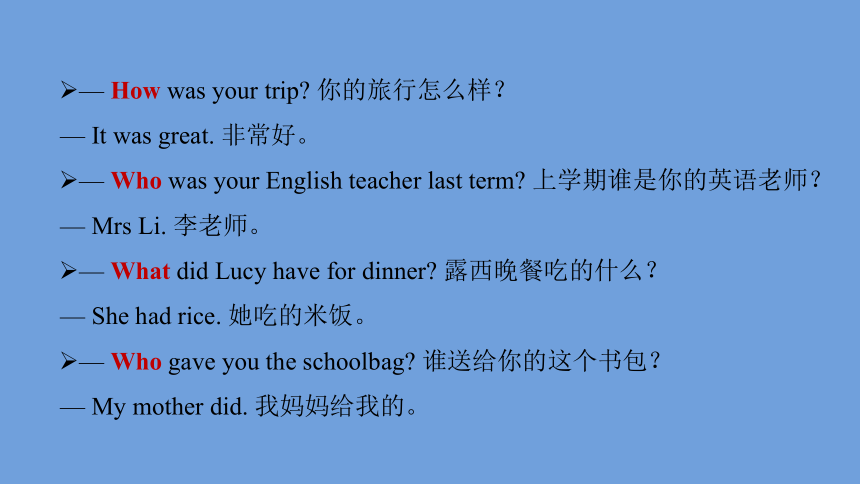

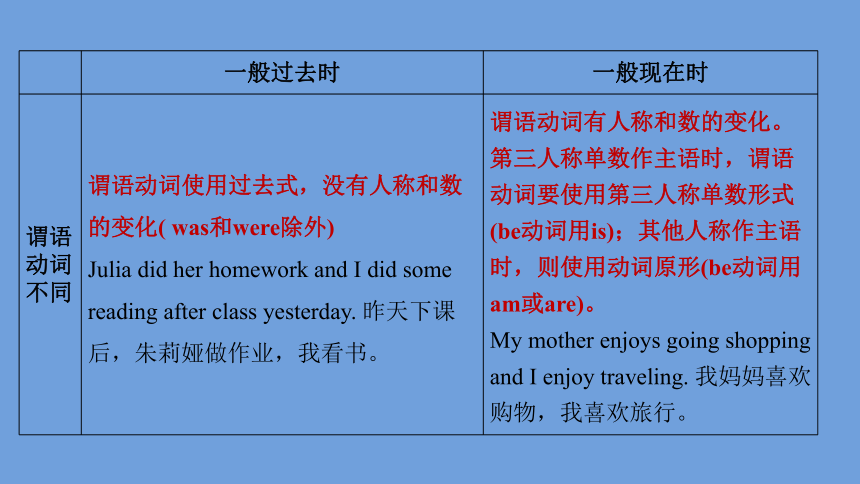
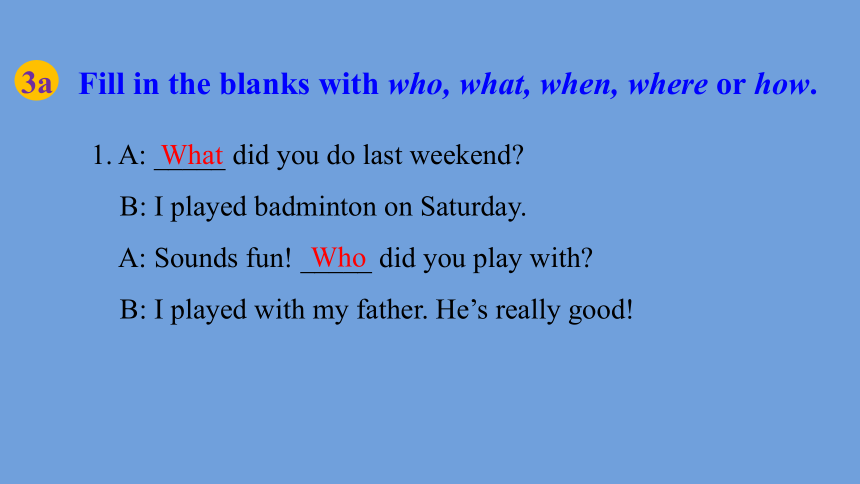
文档简介
(共29张PPT)
Section A (Grammar Focus-3c)
Unit 12 What did you do last weekend
学习目标
Key words & phrases:
away; run away; mouse (mice) ; baby; shout; shout at; woof; language; on Saturday morning .
Key sentences:
1. The weather was beautiful, so I went to the beach with my parents.
2. A family of mice were in the kitchen on Saturday morning when they saw a big cat.
3. That's why it's important to learn a second language.
To learn to ask and answer Wh-questions by using the past simple tense.
Presentation
Grammar Focus
What did you do last weekend I did my homework./ We went boating.
Who visited her grandma Becky did.
Where did she go last weekend She went to a farm.
Who did she go with She went with her classmates.
Grammar
一般过去时
一般过去时表示过去某个时间发生的动作或存在的状态,常与yesterday, last Sunday等表示过去的时间状语连用。
一般过去时的特殊疑问句
含be动词的特殊疑问句 特殊疑问词 + was/were + 主语 + 其他
特殊疑问词(主语) + was/were + 其他
含实义动词的特殊疑问句 特殊疑问词 + did + 主语 + 动词原形 + 其他
特殊疑问词(主语) + 动词过去式 + 其他
— How was your trip 你的旅行怎么样?
— It was great. 非常好。
— Who was your English teacher last term 上学期谁是你的英语老师?
— Mrs Li. 李老师。
— What did Lucy have for dinner 露西晚餐吃的什么?
— She had rice. 她吃的米饭。
— Who gave you the schoolbag 谁送给你的这个书包?
— My mother did. 我妈妈给我的。
一般过去时与一般现在时的区别
一般过去时 一般现在时
用法不同 表示过去某个时间发生的动作或存在的状态。 I played badminton with my father last weekend. 我上周末和爸爸一起打羽毛球了。 表示经常发生或习惯性的动作或现在的状态。
I often play badminton with my father. 我经常和爸爸一起打羽毛球。
时间状语不同 一般过去时常与表示过去的时间状语连用,如last week, yesterday, two days ago, last month等。 He went to Japan last month. 他上个月去了日本。 一般现在时常与表示现在的时间状语连用,如every day, on weekends 等。
We read English every morning. 我们每天早上读英语。
一般过去时 一般现在时
谓语动词不同 谓语动词使用过去式,没有人称和数的变化( was和were除外) Julia did her homework and I did some reading after class yesterday. 昨天下课后,朱莉娅做作业,我看书。 谓语动词有人称和数的变化。第三人称单数作主语时,谓语动词要使用第三人称单数形式(be动词用is);其他人称作主语时,则使用动词原形(be动词用am或are)。
My mother enjoys going shopping and I enjoy traveling. 我妈妈喜欢购物,我喜欢旅行。
3a
Fill in the blanks with who, what, when, where or how.
1. A: _____ did you do last weekend
B: I played badminton on Saturday.
A: Sounds fun! _____ did you play with
B: I played with my father. He’s really good!
What
Who
2. A: _____ was your weekend
B: It was great! I had so much fun!
A: _____ did you go
B: The weather was beautiful, so I went to the beach with my parents.
3. A: _____ did Jim lose
B: He lost his keys. He often loses things.
A: That’s too bad. _____ did he lose them
B: I heard it was yesterday.
How
Where
When
What
1. I _________________ on Saturday.
2. I played badminton _________________.
3. I played badminton with _________________.
4. I went to _________________ with my parents last weekend.
5. He lost _________________ yesterday.
6. He lost his keys _________________.
7. _________________ lost his keys yesterday.
Ask and answer, then complete sentences according to the conversations in 3a.
played badminton
my father
Jim
on Saturday
the beach
his keys
yesterday
What
When
Who
Where
What
When
Who
3b
Complete the passage with the correct forms of the words in the box.
A family of mice were in the kitchen on Saturday morning when they ________ a big cat. Baby Mouse ________ afraid and ________ onto his father’s back. Father Mouse shouted at the cat,
/ma s/ mouse的复数形式 老鼠;耗子
/ be bi/ adj. 幼小的 n. 婴儿
shout / a t/ v. 呼叫;喊叫
say be climb see run away
跑开 away / we / adv. 离开;远离
saw
was
climbed
“Woof, woof!” The cat quickly ________ “Wow, Dad, you’re good!” ________ Baby Mouse. “Well, son, that’s why it’s important to learn a second language,” answered Father Mouse.
/w f/ interj. (狗叫声)汪汪
/ l gw d / n. 语言
ran away
said
Group work
Read and role-play the story in 3a.
A family of mice were in the kitchen on Saturday morning when they saw a big cat. Baby Mouse was afraid and climbed onto his father’s back. Father Mouse shouted at the cat, “Woof, woof!” The cat quickly ran away. “Wow, Dad, you’re good!” said Baby Mouse. “Well, son, that’s why it’s important to learn a second language,” answered Father Mouse.
Narrator
Baby Mouse
Father Mouse
Cat
3c
Think of two things you did last weekend. Draw pictures of them. Your classmates guess what you did.
Let's guess
What did I do
You went with your daughter.
You went boating.
Where did you go on Dragon Boat Day
I went to the countryside.
I watched the boat race.
What did you do there
Language points
shout v. 呼叫;喊叫
1. Father Mouse shouted at the cat, “Woof, woof!” 鼠爸爸冲猫大叫:“汪汪,汪汪!”
【用法详解】shout 在此处作不及物动词,shout at意为“ 冲…… 大声叫嚷” ,at后接喊叫的对象。
There is someone shouting for help. 有人在大声求救。
Speak clearly and slowly. Don’t shout at others. 清楚地慢慢地说。不要冲他人喊叫。
【易混辨析】shout at与shout to
shout at 意为“冲...... 大声叫嚷“,多指因生气或愤怒而冲着某人大声吼叫。 Li Ming’s mother shouted at him for his dishonesty. 妈妈因李明不诚实而对他大声嚷嚷。
shout to 意为“对 ..... 大声喊叫”,目的是让别人听见,多因距离远。 Mary shouted to us to come in and help her. 玛丽大声喊我们进来帮助她。
shout at
shout to
【用法详解】language 在此是可数名词,a second language意为“又一门语言”。表示某种具体语言的词,如 Chinese, English, Japanese 等,是不可数名词。
How many languages can you speak 你会说几门语言?
All the children must learn a foreign language. 所有的儿童必须学一门外语。
language n. 语言
2. “Well, son, that’s why it’s important to learn a second language,”
answered Father Mouse. “所以嘛,儿子,这就是为什么再学一门语言很重要。”鼠爸爸回答道。
That’s why... 句型
【用法详解】该句型意为“这/那就是......的原因”,其中why引导的从句,表示结果。
Tom overslept this morning. That’s why he was late for school. 汤姆今天早晨睡过头了,这就是他上学迟到的原因。
【拓展延伸】“That’s because ... ”也是一 个常用句型,意为
“这/那是因为 …… ”, because引导的从句表示原因。
Tom was late for school this morning. That’s because he overslept. 汤姆今天早晨上学迟到了,那是因为他睡过头了。
Exercises
一、单项选择。
1.—Where did you go last winter vacation
— I ______ to London with my family.
A. go B. have gone C. went D. was going
2.—Wendy, how long have you had the new smartphone
—A couple of days. I ______ it last week.
A. bought B. buy C. will buy D. have bought
3.—Jack, you look more handsome in your new shirt today.
—Oh, really I ______ it in a cheap store with my mom.
A. buy B. will buy C. bought D.have bought
C
A
C
4.—What did you do the day before yesterday
—I ______ for an English test.
A. study B. studied C. studying D.studies
5.They don’t live here any longer. They ______to Chengdu last month.
A. move B. moved C. will move D. are moving
6.—You can’t smoke here.
—Sorry, I ______ the sign.
A. don’t see B. didn’t see C. haven’t seen D. won’t see
B
B
B
二、对画线部分提问。
1.They went to the supermarket yesterday afternoon.
______ ______ they ______ yesterday afternoon
2.They went to Beijing by train.
______ ______ they ______ to Beijing
3.He played the drums last Saturday.
______ ______ he ______ the drums
Where did go
When did play
How did go
4.My father played chess with my grandpa just now.
_____ _____ your father _____ chess with
5.Jenny studied for her English test last weekend.
_____ studied for her English test last weekend
Who did play
Who
Homework
Preview the new words and phrases in Section B(1a-1e).
Do the exercises in students’ book.
Thank you!
Section A (Grammar Focus-3c)
Unit 12 What did you do last weekend
学习目标
Key words & phrases:
away; run away; mouse (mice) ; baby; shout; shout at; woof; language; on Saturday morning .
Key sentences:
1. The weather was beautiful, so I went to the beach with my parents.
2. A family of mice were in the kitchen on Saturday morning when they saw a big cat.
3. That's why it's important to learn a second language.
To learn to ask and answer Wh-questions by using the past simple tense.
Presentation
Grammar Focus
What did you do last weekend I did my homework./ We went boating.
Who visited her grandma Becky did.
Where did she go last weekend She went to a farm.
Who did she go with She went with her classmates.
Grammar
一般过去时
一般过去时表示过去某个时间发生的动作或存在的状态,常与yesterday, last Sunday等表示过去的时间状语连用。
一般过去时的特殊疑问句
含be动词的特殊疑问句 特殊疑问词 + was/were + 主语 + 其他
特殊疑问词(主语) + was/were + 其他
含实义动词的特殊疑问句 特殊疑问词 + did + 主语 + 动词原形 + 其他
特殊疑问词(主语) + 动词过去式 + 其他
— How was your trip 你的旅行怎么样?
— It was great. 非常好。
— Who was your English teacher last term 上学期谁是你的英语老师?
— Mrs Li. 李老师。
— What did Lucy have for dinner 露西晚餐吃的什么?
— She had rice. 她吃的米饭。
— Who gave you the schoolbag 谁送给你的这个书包?
— My mother did. 我妈妈给我的。
一般过去时与一般现在时的区别
一般过去时 一般现在时
用法不同 表示过去某个时间发生的动作或存在的状态。 I played badminton with my father last weekend. 我上周末和爸爸一起打羽毛球了。 表示经常发生或习惯性的动作或现在的状态。
I often play badminton with my father. 我经常和爸爸一起打羽毛球。
时间状语不同 一般过去时常与表示过去的时间状语连用,如last week, yesterday, two days ago, last month等。 He went to Japan last month. 他上个月去了日本。 一般现在时常与表示现在的时间状语连用,如every day, on weekends 等。
We read English every morning. 我们每天早上读英语。
一般过去时 一般现在时
谓语动词不同 谓语动词使用过去式,没有人称和数的变化( was和were除外) Julia did her homework and I did some reading after class yesterday. 昨天下课后,朱莉娅做作业,我看书。 谓语动词有人称和数的变化。第三人称单数作主语时,谓语动词要使用第三人称单数形式(be动词用is);其他人称作主语时,则使用动词原形(be动词用am或are)。
My mother enjoys going shopping and I enjoy traveling. 我妈妈喜欢购物,我喜欢旅行。
3a
Fill in the blanks with who, what, when, where or how.
1. A: _____ did you do last weekend
B: I played badminton on Saturday.
A: Sounds fun! _____ did you play with
B: I played with my father. He’s really good!
What
Who
2. A: _____ was your weekend
B: It was great! I had so much fun!
A: _____ did you go
B: The weather was beautiful, so I went to the beach with my parents.
3. A: _____ did Jim lose
B: He lost his keys. He often loses things.
A: That’s too bad. _____ did he lose them
B: I heard it was yesterday.
How
Where
When
What
1. I _________________ on Saturday.
2. I played badminton _________________.
3. I played badminton with _________________.
4. I went to _________________ with my parents last weekend.
5. He lost _________________ yesterday.
6. He lost his keys _________________.
7. _________________ lost his keys yesterday.
Ask and answer, then complete sentences according to the conversations in 3a.
played badminton
my father
Jim
on Saturday
the beach
his keys
yesterday
What
When
Who
Where
What
When
Who
3b
Complete the passage with the correct forms of the words in the box.
A family of mice were in the kitchen on Saturday morning when they ________ a big cat. Baby Mouse ________ afraid and ________ onto his father’s back. Father Mouse shouted at the cat,
/ma s/ mouse的复数形式 老鼠;耗子
/ be bi/ adj. 幼小的 n. 婴儿
shout / a t/ v. 呼叫;喊叫
say be climb see run away
跑开 away / we / adv. 离开;远离
saw
was
climbed
“Woof, woof!” The cat quickly ________ “Wow, Dad, you’re good!” ________ Baby Mouse. “Well, son, that’s why it’s important to learn a second language,” answered Father Mouse.
/w f/ interj. (狗叫声)汪汪
/ l gw d / n. 语言
ran away
said
Group work
Read and role-play the story in 3a.
A family of mice were in the kitchen on Saturday morning when they saw a big cat. Baby Mouse was afraid and climbed onto his father’s back. Father Mouse shouted at the cat, “Woof, woof!” The cat quickly ran away. “Wow, Dad, you’re good!” said Baby Mouse. “Well, son, that’s why it’s important to learn a second language,” answered Father Mouse.
Narrator
Baby Mouse
Father Mouse
Cat
3c
Think of two things you did last weekend. Draw pictures of them. Your classmates guess what you did.
Let's guess
What did I do
You went with your daughter.
You went boating.
Where did you go on Dragon Boat Day
I went to the countryside.
I watched the boat race.
What did you do there
Language points
shout v. 呼叫;喊叫
1. Father Mouse shouted at the cat, “Woof, woof!” 鼠爸爸冲猫大叫:“汪汪,汪汪!”
【用法详解】shout 在此处作不及物动词,shout at意为“ 冲…… 大声叫嚷” ,at后接喊叫的对象。
There is someone shouting for help. 有人在大声求救。
Speak clearly and slowly. Don’t shout at others. 清楚地慢慢地说。不要冲他人喊叫。
【易混辨析】shout at与shout to
shout at 意为“冲...... 大声叫嚷“,多指因生气或愤怒而冲着某人大声吼叫。 Li Ming’s mother shouted at him for his dishonesty. 妈妈因李明不诚实而对他大声嚷嚷。
shout to 意为“对 ..... 大声喊叫”,目的是让别人听见,多因距离远。 Mary shouted to us to come in and help her. 玛丽大声喊我们进来帮助她。
shout at
shout to
【用法详解】language 在此是可数名词,a second language意为“又一门语言”。表示某种具体语言的词,如 Chinese, English, Japanese 等,是不可数名词。
How many languages can you speak 你会说几门语言?
All the children must learn a foreign language. 所有的儿童必须学一门外语。
language n. 语言
2. “Well, son, that’s why it’s important to learn a second language,”
answered Father Mouse. “所以嘛,儿子,这就是为什么再学一门语言很重要。”鼠爸爸回答道。
That’s why... 句型
【用法详解】该句型意为“这/那就是......的原因”,其中why引导的从句,表示结果。
Tom overslept this morning. That’s why he was late for school. 汤姆今天早晨睡过头了,这就是他上学迟到的原因。
【拓展延伸】“That’s because ... ”也是一 个常用句型,意为
“这/那是因为 …… ”, because引导的从句表示原因。
Tom was late for school this morning. That’s because he overslept. 汤姆今天早晨上学迟到了,那是因为他睡过头了。
Exercises
一、单项选择。
1.—Where did you go last winter vacation
— I ______ to London with my family.
A. go B. have gone C. went D. was going
2.—Wendy, how long have you had the new smartphone
—A couple of days. I ______ it last week.
A. bought B. buy C. will buy D. have bought
3.—Jack, you look more handsome in your new shirt today.
—Oh, really I ______ it in a cheap store with my mom.
A. buy B. will buy C. bought D.have bought
C
A
C
4.—What did you do the day before yesterday
—I ______ for an English test.
A. study B. studied C. studying D.studies
5.They don’t live here any longer. They ______to Chengdu last month.
A. move B. moved C. will move D. are moving
6.—You can’t smoke here.
—Sorry, I ______ the sign.
A. don’t see B. didn’t see C. haven’t seen D. won’t see
B
B
B
二、对画线部分提问。
1.They went to the supermarket yesterday afternoon.
______ ______ they ______ yesterday afternoon
2.They went to Beijing by train.
______ ______ they ______ to Beijing
3.He played the drums last Saturday.
______ ______ he ______ the drums
Where did go
When did play
How did go
4.My father played chess with my grandpa just now.
_____ _____ your father _____ chess with
5.Jenny studied for her English test last weekend.
_____ studied for her English test last weekend
Who did play
Who
Homework
Preview the new words and phrases in Section B(1a-1e).
Do the exercises in students’ book.
Thank you!
同课章节目录
- Unit 1 Can you play the guitar?
- Section A
- Section B
- Unit 2 What time do you go to school?
- Section A
- Section B
- Unit 3 How do you get to school?
- Section A
- Section B
- Unit 4 Don't eat in class.
- Section A
- Section B
- Unit 5 Why do you like pandas?
- Section A
- Section B
- Unit 6 I'm watching TV.
- Section A
- Section B
- Review of Units 1-6
- Unit 7 It's raining!
- Section A
- Section B
- Unit 8 Is there a post office near here?
- Section A
- Section B
- Unit 9 What does he look like?
- Section A
- Section B
- Unit 10 I'd like some noodles.
- Section A
- Section B
- Unit 11 How was your school trip?
- Section A
- Section B
- Unit 12 What did you do last weekend?
- Section A
- Section B
